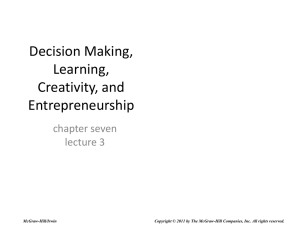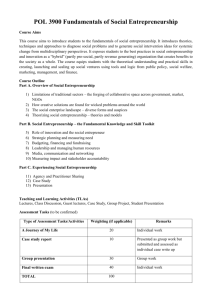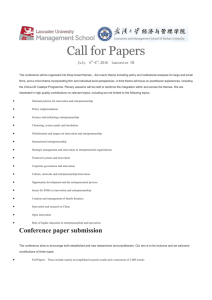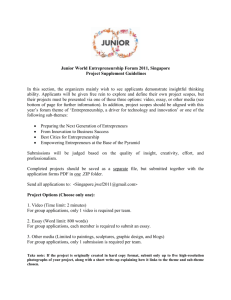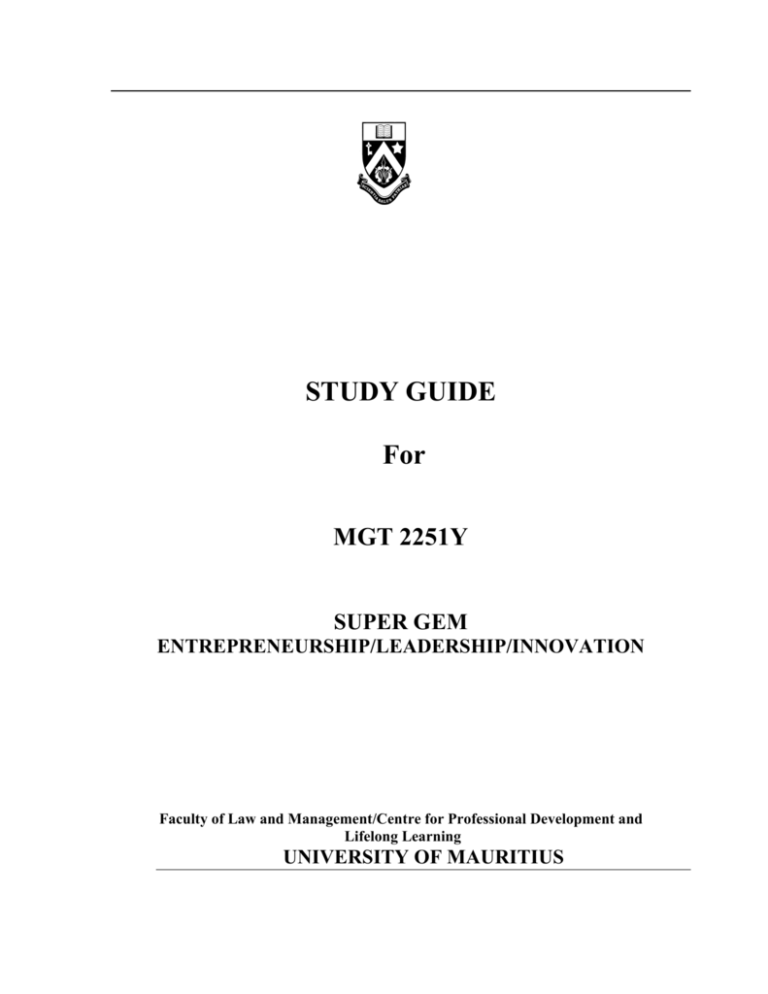
STUDY GUIDE
For
MGT 2251Y
SUPER GEM
ENTREPRENEURSHIP/LEADERSHIP/INNOVATION
Faculty of Law and Management/Centre for Professional Development and
Lifelong Learning
UNIVERSITY OF MAURITIUS
Study Guide
CONTRIBUTORS
ENTREPRENEURSHIP/LEADERSHIP/INNOVATION - was prepared for the Faculty of
law and Management/Centre for Professional Development and Lifelong Learning, University
of Mauritius. The Pro-Vice Chancellor, Teaching and Learning, acknowledges the contribution
of the following course authors from the Faculty of Law and Management:
Mr D Seethiah
Dr R P Gunputh (Unit 14 – Legal Aspects of Entrepreneurship)
The Faculty of law and Management/Centre for Professional Development and Lifelong
Learning also acknowledges the contribution of the Acting Director, VCILT and Ms Y
Rajabalee for overseeing the e-learning part of the module.
September 2009
All rights reserved. No part of the work may be reproduced in any form, without the
written permission from the University of Mauritius, Réduit, Mauritius.
1
Study Guide
MODULE CONTENT
Part I Semester 1: Units 1 – 15
Unit 1
Creativity, Creativity Techniques in Business
Unit 2
Innovation
Unit 3
Technology and Innovation
Unit 4
Innovation Culture and Innovation Management
Unit 5
Linking Creativity, Innovation and Entrepreneurship
Unit 6
Leadership Theories, Leadership and Management
Unit 7
Unit 8
Transformational Leadership and Entrepreneurs –
Entrepreneurial Leadership
Entrepreneurship, The Entrepreneur, Intrapreneurship
Unit 9
Entrepreneurship, Poverty Alleviation and Social Peace
Unit 10
Analysis of the Business Environment of SMEs
Unit 11
Small Business Management II- Marketing for SMEs
Unit 12
Small Business Management II- People Management
Unit 13
Source of Finance and Financial Information for Entrepreneurs
Unit 14
Legal Aspects of Entrepreneurship
Unit 15
The Business Plan
Part II Semester 2: Units 16 – 30
Unit 16
Entrepreneurship and Social Enterprise
Unit 17
Entrepreneurship Culture
2
Study Guide
Unit 18
Role of Government and other institutions in financial and non-financial support
Unit 19
Leadership skills, Communications skills
Unit 20
Negotiation skills
Unit 21
Team Building
Unit 22
Networking, Outsourcing and Geographical Clusters
Unit 23
Corporate Venturing and the Social Entrepreneurship
Unit 24
Women Entrepreneurship/Microcredit Scheme and Social Peace
Unit 25
Strategic HRM, Marketing Strategies and Financial Management for small firms
and the Social Enterprise
Unit 26
The socio economic continuum - governance, Ethics & CSR
Unit 27
Occupational Safety and Health
Unit 28
Business growth strategies
Unit 29
Opportunities in business and Social Entrepreneurship
Unit 30
Business Planning
3
Study Guide
STUDY GUIDE
ENTREPRENEURSHIP/LEADERSHIP/INNOVATION - is a two-semester module (6
credits) for various programmes of studies (Core and Elective).
Title
Code
Duration (hrs)
Super GEM:
MGT
Entrepreneurship/
2251Y
Leadership/Innovation
(90)
No of Credits
Seminars:
12
6
Tutorials On line:
78
Total:
90
Note: Exceptionally for this time, we shall proceed with one-hour face to face tutorial on a
weekly basis.
Rationale & Aims:
Since a few years, the Mauritian economy is undergoing a transition from dependence on trade
preferences to open competition in the global economy. To achieve the necessary economic
turnaround, the country needs to train, develop and nurture a critical mass of entrepreneurs
with the right knowledge, skills and attitude to drive the economy forward.
UoM’s role and responsibility in this respect is to produce a new brand of Quality
entrepreneurs who will be empowered to develop successful businesses with higher survival
rates.
This module aims to complement the education, training and development of prospective
graduates, giving them the technical (management) and entrepreneurial skills necessary to
enhance employability and business acumen so that they can take charge of themselves (and
others), especially in difficult economic situations.
4
Study Guide
The module is also expected to create campus awareness on the necessity to develop
entrepreneurial skills so that our undergraduates can give a competitive edge to their own
organisations or the organisations they will work in.
The Super GEM also aims at developing awareness of social entrepreneurship and application
of entrepreneurial skills to businesses, NGO’s and other social organisations with a view to
professionalise the organisations so that they all can be managed and grown in a more
sustainable manner.
OUTLINE SYLLABUS
Super GEM Parts I & II – Module Code MGT 2251Y
Super GEM Part I
Creativity techniques in Business, Innovation and the Product life Cycle, Types of Innovation
& Innovation Management, Creativity/Innovation/Entrepreneurship, Leadership Theories and
Management, Entrepreneurs, Entrepreneurship, Intrapreneurship
Entrepreneurship, Poverty Alleviation through the Microcredit Scheme, Analysis of the
Business Environment, Small Business Management – HRM, Marketing & Finance, Legal
Aspects of Entrepreneurship, The Business Plan – Structure & Function
Super GEM Part II
Entrepreneurship & Social Enterprise, Entrepreneurship Culture, Role of Government and
other institutions in financial and non-financial support, Leadership skills, Communications
skills, Negotiation skills, Team Building, Networking, Outsourcing and Geographical Clusters,
Corporate Venturing and the Social Entrepreneurship, Women Entrepreneurship/Microcredit
Scheme and Social Peace, Strategic HRM, Marketing Strategies and Financial Management for
small firms and the Social Enterprise, The socio economic continuum - governance, Ethics &
CSR, Occupational Safety & Health, Business growth strategies, Opportunities in business and
Social Entrepreneurship, Business Planning
5
Study Guide
LEARNING OBJECTIVES FOR THE COURSE
Upon satisfactory completion of this module, you will be able to:
(Part I)
•
Apply creativity techniques in business within an understanding of the link between
creativity, innovation and entrepreneurship.
•
Develop innovation management skills in order to ride another product life cycle at
each maturity stage.
•
Explain the role of business leaders and leadership styles in shaping organisation
culture.
•
Grasp the notions of entrepreneurs, intrapreneurs and entrepreneurship as it applies to
public, private and not for profit organisations.
•
Apply entrepreneurship concepts to poverty alleviation and its links to social peace.
•
Analyse the business environment so as to enable development of HR, Marketing,
Finance and other business strategies.
•
Identify the legal aspects related to business setting in relation with specific business
legislation and obtention of licences.
•
Develop a Business Plan within the context of the current and forecasted business
environment given the available resources and capabilities.
(Part II)
•
Explain the importance of entrepreneurial values and skills in managing SMEs and
the social enterprise.
•
Critically analyse the role of government in supporting SMEs, both financially and
non financially.
•
Develop entrepreneurial skills in Leadership, Communications, Negotiation, Team
building and Networking through practical exercises, simulations and role plays.
•
Compare the roles of business organisation as corporate ventures and NGO’s as
social entrepreneurship drivers.
•
Discuss the importance of women entrepreneurship and empowerment of other
vulnerable groups in enhancing employability and poverty alleviation.
•
Select strategic approaches to Marketing, HR and Financial Management of SMEs
6
Study Guide
and NGO’s in a social enterprise perspective.
•
Apply corporate governance, ethics and CSR in a socio economic continuum for
sustainable business management.
•
Develop awareness of Occupational Health and Safety in the context of paid
employment and for NGO volunteers.
•
Identify business opportunities with a view to design, build and grow the
entrepreneurial organisation.
•
Visualise the Business Plan both as a communications tool and a strategic tool.
•
Develop business planning skills towards the construction of a viable
Entrepreneurial Project, either for business or a social endeavour.
MODULE DESCRIPTION
This module is delivered using blended mode:
•
•
•
•
With CD-ROM for off-line access to module contents.
Website with all the module contents and activities (later).
Four face to face workshops to be conducted in second semester.
One hour face to face tutorials weekly (temporarily).
For this module, you will be issued with the following:a. Study guide giving you an overview of the contents of the module.
b. Website (to be provided by VCILT at a later stage).
In the individual units, you will be guided to:
i.
ii.
iii.
iv.
Read the content of the unit.
Complete some research and readings.
Submit your answer to some specified group activities
Read some web links related to the topic under discussion.
c. A CDROM, consisting of the whole course to enable you to view the content offline.
7
Study Guide
YOUR TUTOR
Refer to the Course Map to check the unit(s) you must prepare each week.
Make sure that you:
•
•
•
Study the course notes and readings for the relevant unit.
Work on activities in groups of around 5 students.
Prepare your answer for activities before tutorials (when & where applicable).
Make the most of your group sessions to discuss your views and ideas with your fellow
classmates. You are encouraged to discuss the answers to the activities with your peers.
ASSESSMENT (This may be modified, based on temporary mode of delivery by face to
face tutorial)
Weightage (%)
Submission Date
Business Plan (Final)
45 %
Week 33
Assignment
15 %
Week 18
Online participation/coursework
40 %
(Activities etc.)
Total Marks
100 %
The module will be assessed through Coursework (including a number of Group Activities e.g.
Case Studies), a Summary Business Plan to be submitted in week 18 and a full Business Plan
to be submitted in week 33. Business Plans are all individual submissions.
A. Activities
These include questions that are to be attempted in Groups of around five students.
These activities are aimed at enhancing the following competencies:
- Engage in collaborative learning through group discussions.
- Demonstrate critical thinking.
- Research on specified themes and sharing knowledge.
- Improve team-working skills.
- Increase transferability of knowledge through case analysis and reporting.
8
Study Guide
Reports on Activities (where specified) will in general be of one page length and structured as
follows:
Cover Sheet with the following instruction:
- Title of report, for example, Case Study or research subject.
- Group members’ Index numbers.
- Course/Programme/Year.
- Module Title.
- Number of words.
Structure of Report:
Format is flexible to suit nature of assignment and would normally contain the following:
- Definition of the problem.
- Conceptual framework (if any).
- Methodology (if applicable).
- Analysis.
- Recommendation.
- Conclusion.
“Copy/Paste” answers from the literature will not be acceptable. A fair degree of analysis
of research findings (following group discussion) will be necessary before reporting.
B. Summary Business Plan
As per Guidelines to be provided in Unit 15.
C. Business Plan
As per Guidelines to be provided in Unit 15 and Unit 30.
RECOMMENDED READINGS
Author
Burns, P. (2001)
Title of Book
Entrepreneurship and Small Business
Schaper, M. & Volery, T. (2004)
Entrepreneurship and Small Business
Scarborough, N. & Zimmerer, T.
(2006)
Bolton, B. & Thompson, J. (2000)
Effective Small Business Management
Levy, M. & Powell, T. (2005)
Strategies for growth in SMEs
Entrepreneurs, Talent, Temperament and Techniques
N.B: List is not exhaustive. You are strongly advised to read the maximum of authors to
develop a holistic view of the subject matter.
9
Study Guide
Electronic Libraries
EBSCO database
Emerald Library
http://search.ebscohost.com
http://www.emeraldinsight.com
STUDY TIPS
1. Spend some time in navigating through the course content: CD and Online.
2. Read attentively your Overview section to know what is expected from you as a
student for this particular course. Take your time to read the Learning Objectives of
each unit before going through the readings, attempting the activities and assignments.
3. Share your work, educational experiences and involve in collaborative tasks with peers:
all these form part of an effective and collaborative learning process.
4. Communicate your doubts and queries to peers and tutor: either during online
discussion, through emails or during face to face sessions.
5. Manage your time, by sticking to Course Map, to ensure that your workload does not
pile up.
6. Be Self-motivated, self-disciplined and dedicated: try to commit 3-4 hours per
week (reading materials, activities, assignments and online participation) to your
module.
7. Involve in critical thinking as part of learning activities, through the Case studies and
additional reading materials.
8. Have access to a computer with “proper” Internet connection and install all the required
software beforehand.
10
Study Guide
COURSE MAP (May be modified, based on temporary mode of delivery by face to face
tutorial). Disregard highlighted tasks for time being.
Week
Unit
1
1
Learner Tasks
Topics
•
Creativity at an individual level
– Brain processes
Week
Unit
2
2
•
Developing creativity
•
Creativity process
•
Barriers to creativity
•
Creating a climate for Creativity
•
Creativity Techniques
•
•
•
Study Unit 1
Attempt Activities in groups
To be sent to tutor: Group
report on Activity 8
Visit websites:
•
• Misinterpretations of Innovation
• Categories of Innovation
• Innovation and firm size
•
•
•
3
3
•
FEDEX
Learner Tasks
Innovation and Technology–
People and Conditions
•
www. Brainstorming.co.u
Research Activity: Innovation
Topics
•
-
Study Unit 2
Attempt Activities in groups
To be sent to tutor: Group report
on Activity 14
• Innovation and external linkages
Unit
www.creax.com/csa
Learner Tasks
Topics
• Sources of innovation
Week
-
•
•
•
Research and Development
(R & D) & Technology Transfer
•
– a University Business Incubators
Study Unit 3
Attempt Activities in groups
To be sent to tutor: Analyse
Case Study: uSHIP and send
Group report
Research Activity – University
pre-incubator Faculty of
Engineering
•
Technology trends and applications
•
•
Examples of high opportunity
NCB-ICT incubator
product categories related to
current technological innovations
11
Visit websites:
Study Guide
Week
Unit
4
4
Learner Tasks
Topics
•
•
•
•
Entrepreneurial Leadership for
Innovation
•
Creating a culture of innovation
•
Managing innovation development
Study Unit 4
Attempt Activities in groups
To be sent to tutor: Analyse
Case Study: 3M and send Group
report
within organisations
•
Managerial roles and behaviours in
support of innovation
•
Systems in support of innovation
•
Other Structures conducive to
innovation
Week
Unit
5
5
Learner Tasks
Topics
•
Sources of Business Ideas
•
Stages in the start-up process
•
Creativity as a pre-requisite to
•
•
•
Study Unit 5
Attempt Activities in groups
To be sent to tutor: Analyse Case
Study: The Body Shop and send
Group report
• Research Activity
– J.I.T
– CRM
innovation
•
Creativity and Innovation
•
Networking and Innovation
•
Innovation and External linkages
•
A process model of Creativity,
Innovation and Entrepreneurship
Week
Unit
6
6
Learner Tasks
Topics
•
Leadership Theories – Business
Leadership
•
Leadership and Management
•
Training in leadership
12
•
•
•
Study Unit 6
Attempt Activities in groups
To be sent to tutor: Analyse Case
Study: IBM and send Group report
Study Guide
Week
Unit
7
7
Learner Tasks
Topics
•
Entrepreneurial Leadership
•
Business failures and signals of
•
•
•
Study Unit 7
Attempt Activities in groups
To be sent to tutor: Analyse Case
Study: Innovation in the midst of
crisis( Activity 4) and send Group
report
weak entrepreneurial leadership
Week
Unit
8
8
Learner Tasks
Topics
•
•
•
Entrepreneurship – historical
Study Unit 8
Attempt Activities in groups
(Activity 4)
• To be sent to tutor: Analyse
Case Study: Rebecca Smith
(Activity 4) and send Group report
evolution
•
Entrepreneurship – definitions
•
The dimensions of Entrepreneurship
•
The Entrepreneur - Entrepreneurial
traits
•
Economic importance of
entrepreneurship and SME’ s
•
Advantages and Risks of
entrepreneurship
•
Week
Unit
9
9
Intrapreneurship
Learner Tasks
Topics
•
Poverty as a threat to Peace
•
Entrepreneurship and
Entrepreneurial Culture
•
Free Market economies, Wealth &
Poverty
•
Social Business
•
Microcredit
13
•
•
•
Study Unit 9
Attempt Activities in groups
To be sent to tutor: Analyse Case
Study: Big Issue (Activity 6) and
send Group report
• Research Activity
– GINI Coefficient
– Adam Smith
Study Guide
Week
Unit
10
10
Learner Tasks
Topics
•
Influences on small firm
formation and survival
•
Competitor Analysis
•
Analysis of the External
•
•
•
Study Unit 10
Attempt Activities in groups
To be sent to tutor: Group report
on Activity 1
• Research Activity
– Theodore Levitt
Environment
Week
Unit
11
11
Topics
Learner Tasks
•
Marketing for Small firms
•
The marketing system – The Small
firm and its business environment
Week
Unit
12
12
•
Mini Case Study
•
The Marketing Mix
•
Market Research – A second choice
•
Marketing failures
•
•
•
•
Study Unit 11
Attempt Activities in groups
To be sent to tutor: Group report
on Activity 12
Start working on Individual
Assignment (Draft Business Plan
– Super GEM Part I) by
attempting Activity 1 and
Activity 2 and relating to your
personal proposed business
venture
Topics
Learner Tasks
•
HRM definition and Functions
•
HR Strategies
•
HR Planning for small firms
•
Recruitment decision making for SME’s
•
Selection
•
Induction training and skills based
training
•
Performance management system(PMS)
•
Reward Management, Performance
Related Pay
•
Other HR issues
•
SME specific HR practices
14
•
•
Study Unit 12
Attempt Activities in
groups
• To be sent to tutor: Group
report on Activity 4
• Research Activity
– Equal Opportunities Act
• To start writing on Draft
Business Plan. As
preparatory, start reading
Unit 15 in advance
Study Guide
Week
Unit
13
13
Week
Unit
14
14
Learner Tasks
Topics
•
Presenting a case for finance
•
Equity financing
•
Debt Financing
•
Other sources of Finance
•
Financial information
•
Financial Control
•
IT and the finance function
•
•
•
Study Unit 13
Attempt Activities in groups
To be sent to tutor: Group report
on Activity 1
• Research Activity
– SBID’s
Learner Tasks
Topics
•
Legal Aspects of Business
•
Company Law & Droit Des Societes
•
General Business and Finance Legislation
•
Licences
•
Employee and Employers’ Rights
•
Law of Contract
•
International Business Law: Negotiable
•
•
•
Study Unit 14
Attempt Activities in
groups
To be sent to tutor:
Activities on
Company Law and
Law of “Societes”
(Section 14.2)
Instruments
Week
Unit
15
15
•
Health and Safety Legislation
•
Fair Trade
•
Legal Barriers to Social Entrepreneurship
Learner Tasks
Topics
•
The Business Plan within the Strategic
Planning Process
•
The Business Plan: Structure, Contents and
•
•
•
•
Style
•
The Constituents of a Business Plan
•
The Entrepreneur and his/her team
•
Business Plan Outline
15
Study Unit 15
Attempt Activities in groups
To be sent to tutor: Group
report on Activity 8
Assignment: To submit a
Draft Business Plan
(individual) based on a
personal idea for a business
venture




